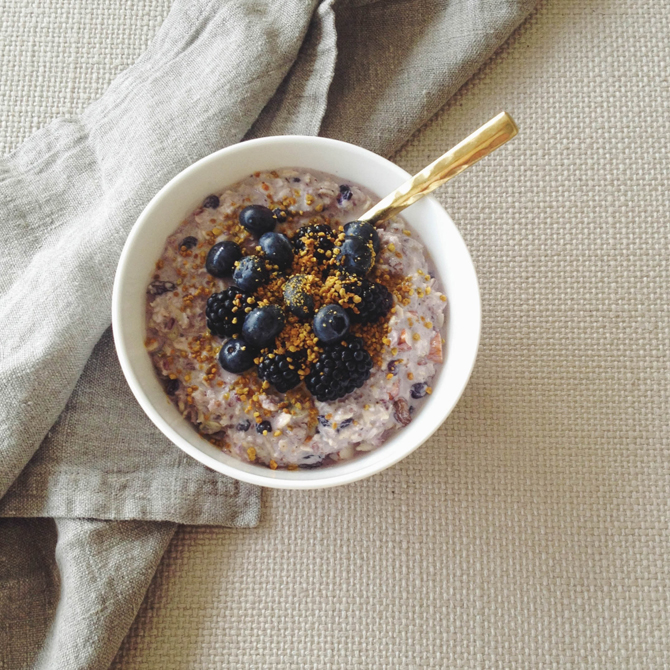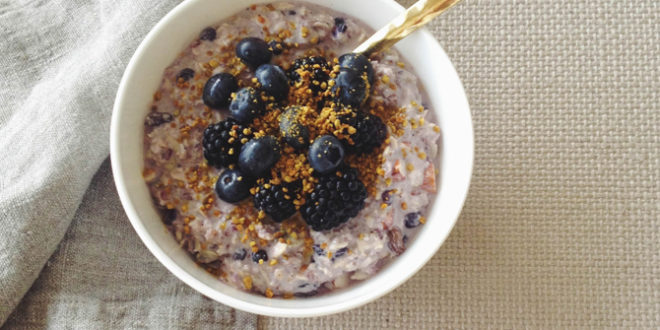Hearty, healthy and wonderfully chewy, porridge has been a breakfast staple for centuries. The Scots embrace it as their national grain, while the Norwegians have been enjoying steaming bowls of porridge since the Viking era. Today, you’ll even see it in trendy brunch cafes, topped with colourful extras like berries, almonds, dates and cinnamon. Feeling hungry yet?
If you’re still not convinced that oatmeal runs circles around muesli and other cereals, check out some of the top benefits below:
Slow burning carbs
There’s no denying that oatmeal is delicious, but what most people don’t know is that it’s also a nutritional goldmine. Yes, it’s a carbohydrate. But it’s a slow carb which means it has a low glycemic index and is high in fibre, protein and essential fatty acids.
 Energy for hours
Energy for hours
Unlike packaged cereals, white toast and a single piece of fruit, oatmeal keeps your energy levels up for hours. Basically whole grains like oatmeal are absorbed slower, which means you feel fuller, and more energised for longer. If you want an energy boost during the day, why not try making your own healthy oatmeal raisin bars?
A prebiotic
As an effective prebiotic, oatmeal actively feeds the good bacteria in your body and helps to maintain a healthy gut. Amp things up by throwing a handful of chopped banana or blueberries into your bowl. Oats are also rich in antioxidants like avenanthramides. Basically, they increase the production of nitric oxide which helps to lower the blood pressure, and ease inflammation.
Beta-Glucan
Ever wondered what makes oats so deliciously chewy? They’re packed full of beta-glucan, a type of soluble fibre that dissolves in water and creates a viscous, gel-like solution. This sits in the gut and helps to reduce cholesterol levels, lower blood sugar and insulin response, promote the growth of good bacteria and keep you feeling fuller, for longer. This also makes a bowl of oatmeal a great way to lose weight, and keep your appetite in check.
Combating phytic acid
Due to high phytic acid content, oats actively bind to minerals like magnesium, calcium, iron, and zinc. For this reason, some nutritionists maintain that oats can trigger mineral deficiencies, and hinder important digestive enzymes such as pepsin, amylase and trypsin. If you’re concerned about the phytic acid content of oats try soaking a serving overnight in a bowl of water, almond milk or coconut milk. They’ll swell up, and reduce phytic acid content by the time you’re ready for breakfast in the morning.
Our go-to loaded oatmeal recipe
 Now you know why oatmeal should be your new breakfast staple, here’s a tasty recipe to get you started.
Now you know why oatmeal should be your new breakfast staple, here’s a tasty recipe to get you started.
- ¾ cup oatmeal
- 1 cup almond milk (or water/coconut milk etc.)
- ¼ teaspoon sea salt flakes
- Handful of blueberries
- Handful of chopped almonds
- Chopped dates
- Teaspoon raw cocoa nibs
- Sprinkling of cinnamon
Mix oats, milk and salt together and let the mixture sit overnight. The next morning, enjoy raw or heat up in the microwave to further reduce the phytic acid content. Throw the extra ingredients on top, and you’ve got one seriously delicious, and surprisingly healthy brekkie.










alex grin - 7 years ago
Thanks for the great article! Completely agree with the author. I think healthy eating is the basis for a well-functioning body. I also want to lose some weight. For that purpose I attend the gym three times per week + run everymorning. Also my trainer advised me to try Isagenix 9 day cleanse program to lose weight safely and effectively. I’ve already passed 5 days and I feel great. Hope to lose 15 lbs in two weeks